Ethical Considerations in Pediatric Care: Informed Consent & Reporting
VerifiedAdded on 2023/06/08
|9
|2041
|208
Essay
AI Summary
This essay explores the multifaceted role of nursing professionals in caring for infants, children, and young patients, emphasizing the ethical considerations surrounding informed consent and mandatory reporting. It highlights the importance of nurses providing comprehensive information to parents or legal guardians to facilitate informed decision-making regarding treatment options, risks, and benefits. The essay also delves into the significance of mandatory reporting in ensuring quality and continuity of care, effective delegation to other healthcare workers, and adherence to relevant policies and guidelines. By upholding ethical standards and maintaining meticulous documentation, nurses contribute to patient and family satisfaction, prevent legal complications, and promote safe and effective healthcare practices for young patients.
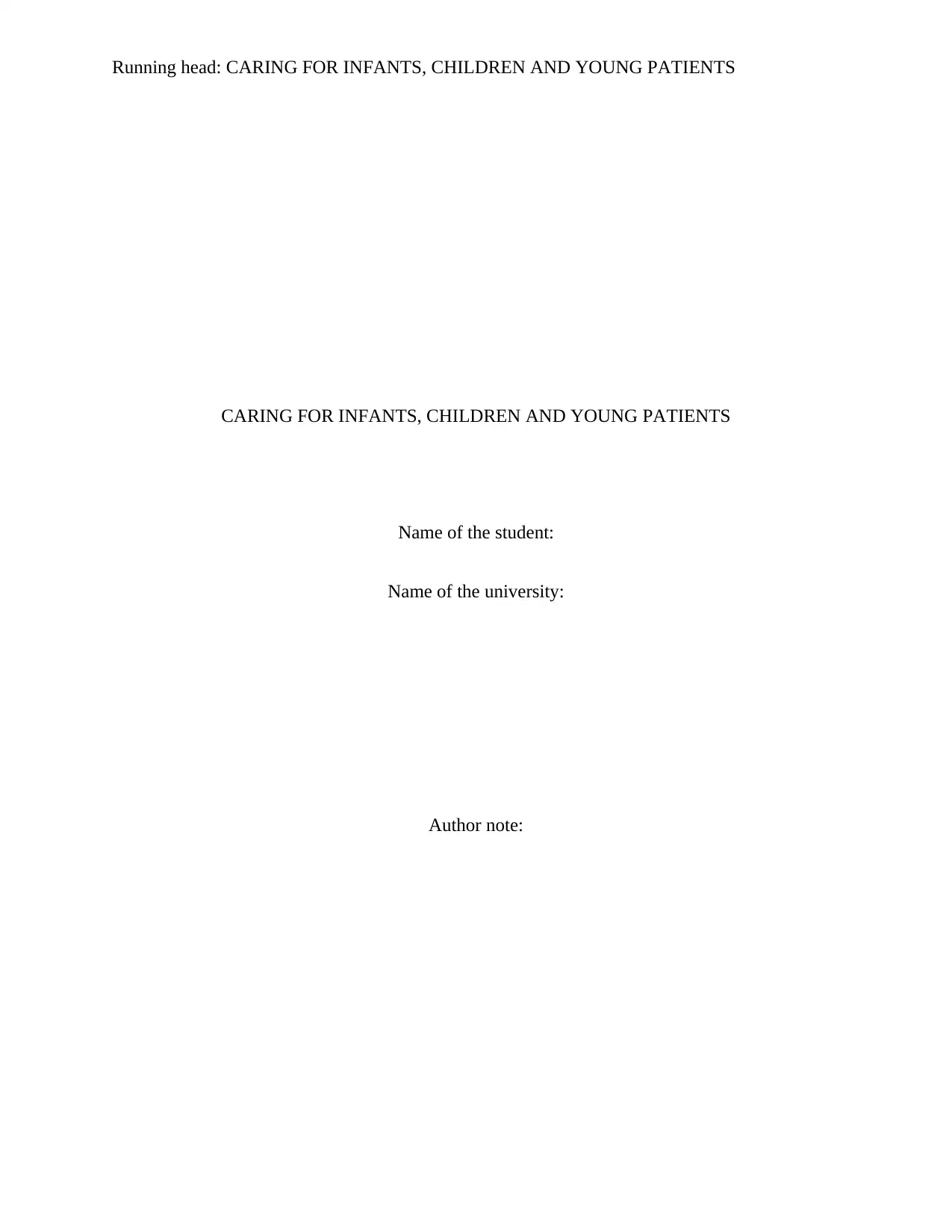
Running head: CARING FOR INFANTS, CHILDREN AND YOUNG PATIENTS
CARING FOR INFANTS, CHILDREN AND YOUNG PATIENTS
Name of the student:
Name of the university:
Author note:
CARING FOR INFANTS, CHILDREN AND YOUNG PATIENTS
Name of the student:
Name of the university:
Author note:
Paraphrase This Document
Need a fresh take? Get an instant paraphrase of this document with our AI Paraphraser
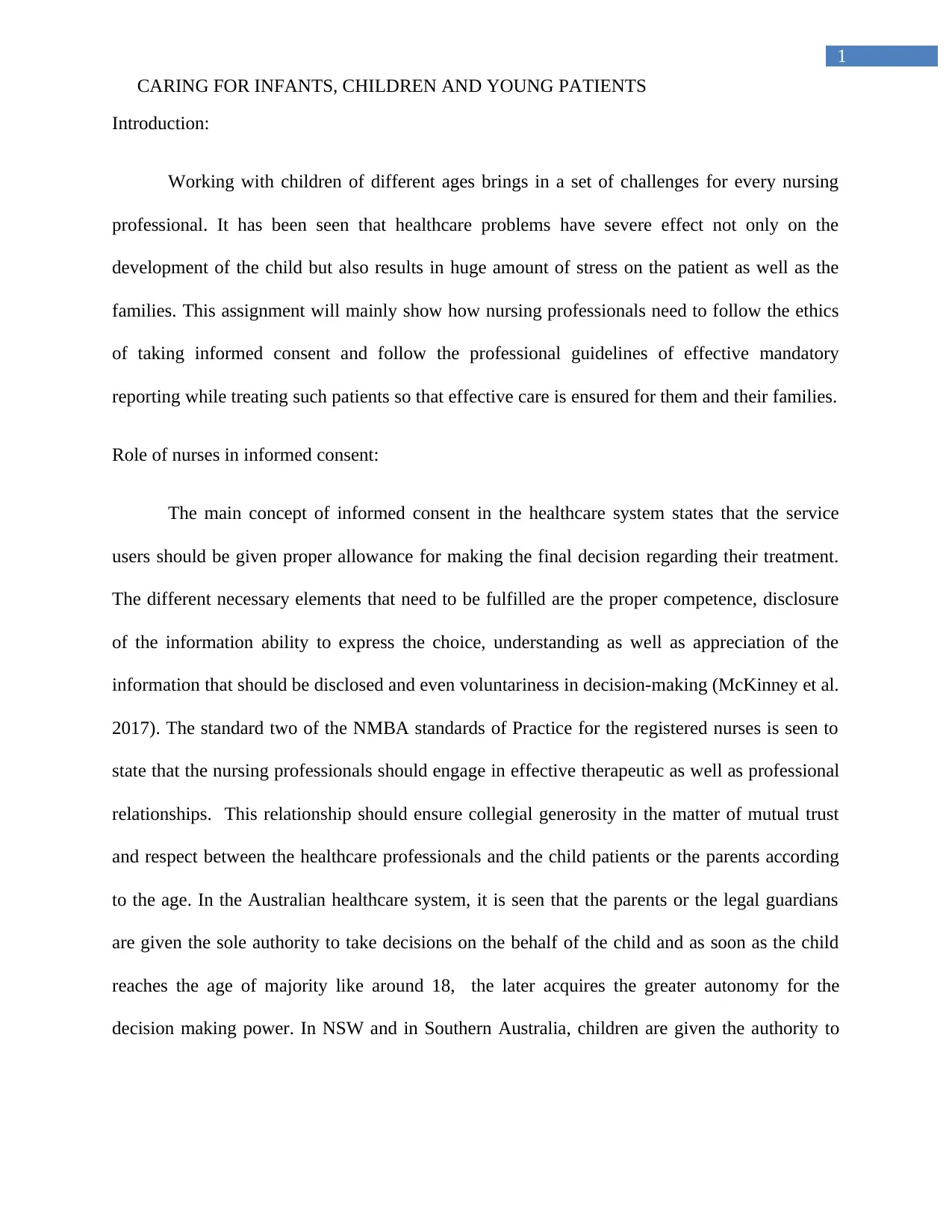
1
CARING FOR INFANTS, CHILDREN AND YOUNG PATIENTS
Introduction:
Working with children of different ages brings in a set of challenges for every nursing
professional. It has been seen that healthcare problems have severe effect not only on the
development of the child but also results in huge amount of stress on the patient as well as the
families. This assignment will mainly show how nursing professionals need to follow the ethics
of taking informed consent and follow the professional guidelines of effective mandatory
reporting while treating such patients so that effective care is ensured for them and their families.
Role of nurses in informed consent:
The main concept of informed consent in the healthcare system states that the service
users should be given proper allowance for making the final decision regarding their treatment.
The different necessary elements that need to be fulfilled are the proper competence, disclosure
of the information ability to express the choice, understanding as well as appreciation of the
information that should be disclosed and even voluntariness in decision-making (McKinney et al.
2017). The standard two of the NMBA standards of Practice for the registered nurses is seen to
state that the nursing professionals should engage in effective therapeutic as well as professional
relationships. This relationship should ensure collegial generosity in the matter of mutual trust
and respect between the healthcare professionals and the child patients or the parents according
to the age. In the Australian healthcare system, it is seen that the parents or the legal guardians
are given the sole authority to take decisions on the behalf of the child and as soon as the child
reaches the age of majority like around 18, the later acquires the greater autonomy for the
decision making power. In NSW and in Southern Australia, children are given the authority to
CARING FOR INFANTS, CHILDREN AND YOUNG PATIENTS
Introduction:
Working with children of different ages brings in a set of challenges for every nursing
professional. It has been seen that healthcare problems have severe effect not only on the
development of the child but also results in huge amount of stress on the patient as well as the
families. This assignment will mainly show how nursing professionals need to follow the ethics
of taking informed consent and follow the professional guidelines of effective mandatory
reporting while treating such patients so that effective care is ensured for them and their families.
Role of nurses in informed consent:
The main concept of informed consent in the healthcare system states that the service
users should be given proper allowance for making the final decision regarding their treatment.
The different necessary elements that need to be fulfilled are the proper competence, disclosure
of the information ability to express the choice, understanding as well as appreciation of the
information that should be disclosed and even voluntariness in decision-making (McKinney et al.
2017). The standard two of the NMBA standards of Practice for the registered nurses is seen to
state that the nursing professionals should engage in effective therapeutic as well as professional
relationships. This relationship should ensure collegial generosity in the matter of mutual trust
and respect between the healthcare professionals and the child patients or the parents according
to the age. In the Australian healthcare system, it is seen that the parents or the legal guardians
are given the sole authority to take decisions on the behalf of the child and as soon as the child
reaches the age of majority like around 18, the later acquires the greater autonomy for the
decision making power. In NSW and in Southern Australia, children are given the authority to
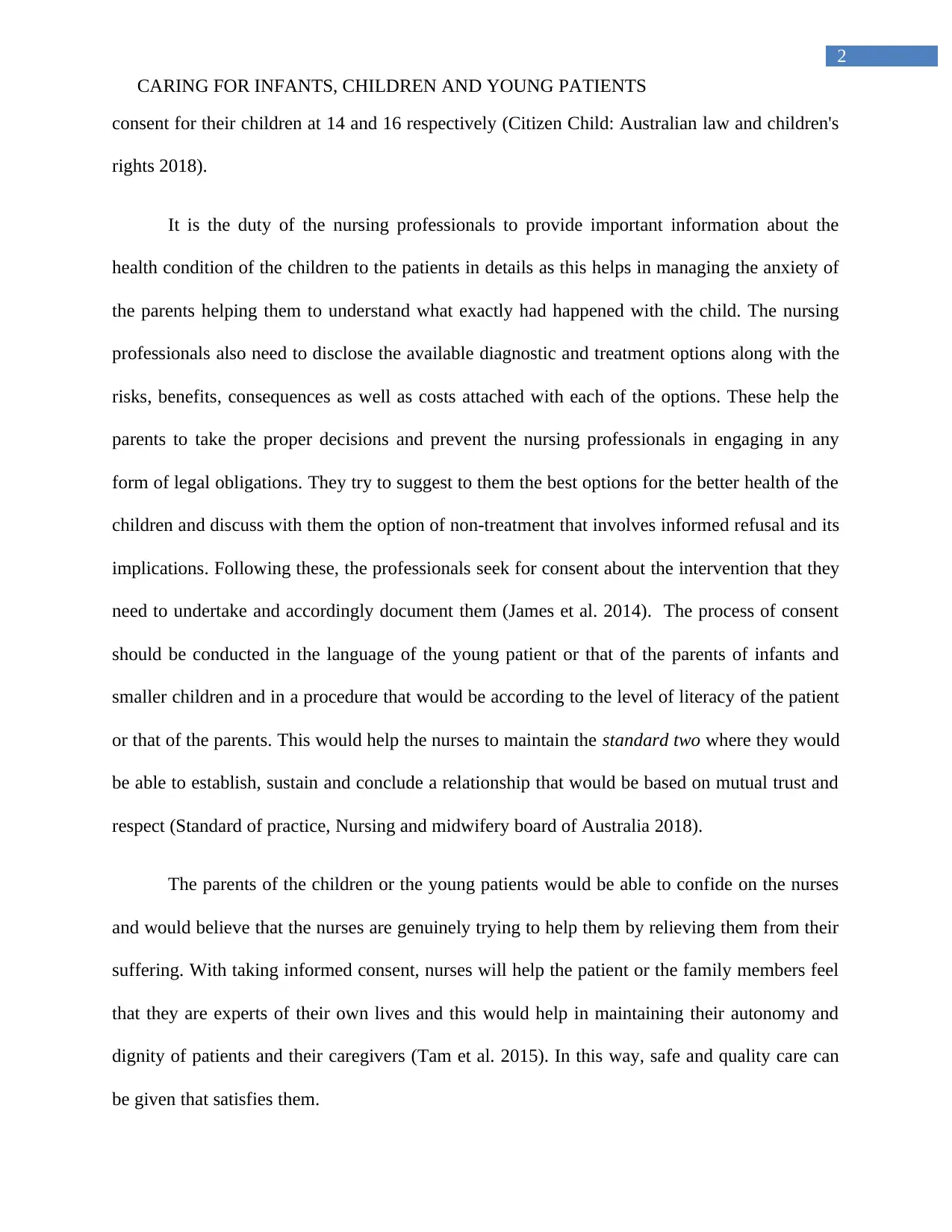
2
CARING FOR INFANTS, CHILDREN AND YOUNG PATIENTS
consent for their children at 14 and 16 respectively (Citizen Child: Australian law and children's
rights 2018).
It is the duty of the nursing professionals to provide important information about the
health condition of the children to the patients in details as this helps in managing the anxiety of
the parents helping them to understand what exactly had happened with the child. The nursing
professionals also need to disclose the available diagnostic and treatment options along with the
risks, benefits, consequences as well as costs attached with each of the options. These help the
parents to take the proper decisions and prevent the nursing professionals in engaging in any
form of legal obligations. They try to suggest to them the best options for the better health of the
children and discuss with them the option of non-treatment that involves informed refusal and its
implications. Following these, the professionals seek for consent about the intervention that they
need to undertake and accordingly document them (James et al. 2014). The process of consent
should be conducted in the language of the young patient or that of the parents of infants and
smaller children and in a procedure that would be according to the level of literacy of the patient
or that of the parents. This would help the nurses to maintain the standard two where they would
be able to establish, sustain and conclude a relationship that would be based on mutual trust and
respect (Standard of practice, Nursing and midwifery board of Australia 2018).
The parents of the children or the young patients would be able to confide on the nurses
and would believe that the nurses are genuinely trying to help them by relieving them from their
suffering. With taking informed consent, nurses will help the patient or the family members feel
that they are experts of their own lives and this would help in maintaining their autonomy and
dignity of patients and their caregivers (Tam et al. 2015). In this way, safe and quality care can
be given that satisfies them.
CARING FOR INFANTS, CHILDREN AND YOUNG PATIENTS
consent for their children at 14 and 16 respectively (Citizen Child: Australian law and children's
rights 2018).
It is the duty of the nursing professionals to provide important information about the
health condition of the children to the patients in details as this helps in managing the anxiety of
the parents helping them to understand what exactly had happened with the child. The nursing
professionals also need to disclose the available diagnostic and treatment options along with the
risks, benefits, consequences as well as costs attached with each of the options. These help the
parents to take the proper decisions and prevent the nursing professionals in engaging in any
form of legal obligations. They try to suggest to them the best options for the better health of the
children and discuss with them the option of non-treatment that involves informed refusal and its
implications. Following these, the professionals seek for consent about the intervention that they
need to undertake and accordingly document them (James et al. 2014). The process of consent
should be conducted in the language of the young patient or that of the parents of infants and
smaller children and in a procedure that would be according to the level of literacy of the patient
or that of the parents. This would help the nurses to maintain the standard two where they would
be able to establish, sustain and conclude a relationship that would be based on mutual trust and
respect (Standard of practice, Nursing and midwifery board of Australia 2018).
The parents of the children or the young patients would be able to confide on the nurses
and would believe that the nurses are genuinely trying to help them by relieving them from their
suffering. With taking informed consent, nurses will help the patient or the family members feel
that they are experts of their own lives and this would help in maintaining their autonomy and
dignity of patients and their caregivers (Tam et al. 2015). In this way, safe and quality care can
be given that satisfies them.
⊘ This is a preview!⊘
Do you want full access?
Subscribe today to unlock all pages.

Trusted by 1+ million students worldwide
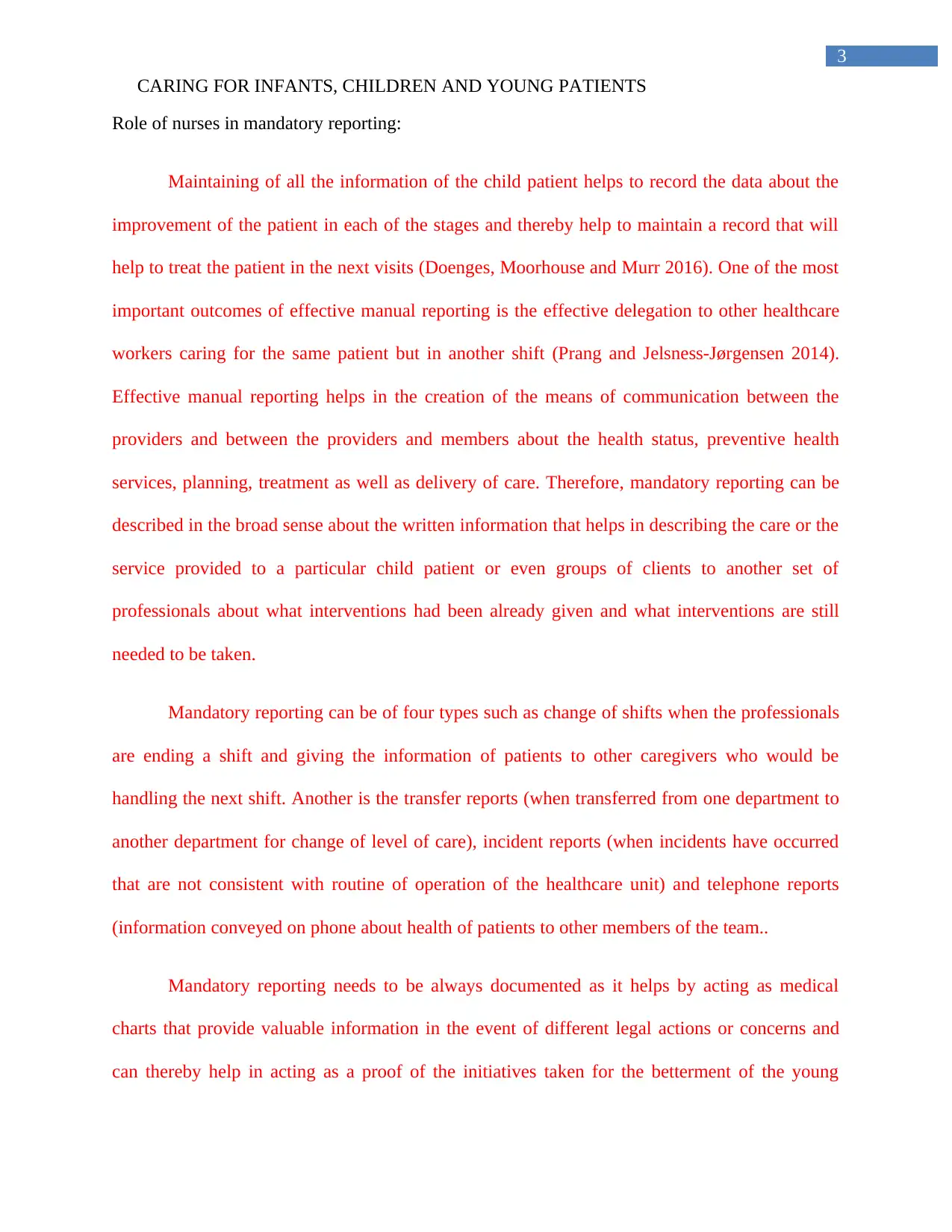
3
CARING FOR INFANTS, CHILDREN AND YOUNG PATIENTS
Role of nurses in mandatory reporting:
Maintaining of all the information of the child patient helps to record the data about the
improvement of the patient in each of the stages and thereby help to maintain a record that will
help to treat the patient in the next visits (Doenges, Moorhouse and Murr 2016). One of the most
important outcomes of effective manual reporting is the effective delegation to other healthcare
workers caring for the same patient but in another shift (Prang and Jelsness-Jørgensen 2014).
Effective manual reporting helps in the creation of the means of communication between the
providers and between the providers and members about the health status, preventive health
services, planning, treatment as well as delivery of care. Therefore, mandatory reporting can be
described in the broad sense about the written information that helps in describing the care or the
service provided to a particular child patient or even groups of clients to another set of
professionals about what interventions had been already given and what interventions are still
needed to be taken.
Mandatory reporting can be of four types such as change of shifts when the professionals
are ending a shift and giving the information of patients to other caregivers who would be
handling the next shift. Another is the transfer reports (when transferred from one department to
another department for change of level of care), incident reports (when incidents have occurred
that are not consistent with routine of operation of the healthcare unit) and telephone reports
(information conveyed on phone about health of patients to other members of the team..
Mandatory reporting needs to be always documented as it helps by acting as medical
charts that provide valuable information in the event of different legal actions or concerns and
can thereby help in acting as a proof of the initiatives taken for the betterment of the young
CARING FOR INFANTS, CHILDREN AND YOUNG PATIENTS
Role of nurses in mandatory reporting:
Maintaining of all the information of the child patient helps to record the data about the
improvement of the patient in each of the stages and thereby help to maintain a record that will
help to treat the patient in the next visits (Doenges, Moorhouse and Murr 2016). One of the most
important outcomes of effective manual reporting is the effective delegation to other healthcare
workers caring for the same patient but in another shift (Prang and Jelsness-Jørgensen 2014).
Effective manual reporting helps in the creation of the means of communication between the
providers and between the providers and members about the health status, preventive health
services, planning, treatment as well as delivery of care. Therefore, mandatory reporting can be
described in the broad sense about the written information that helps in describing the care or the
service provided to a particular child patient or even groups of clients to another set of
professionals about what interventions had been already given and what interventions are still
needed to be taken.
Mandatory reporting can be of four types such as change of shifts when the professionals
are ending a shift and giving the information of patients to other caregivers who would be
handling the next shift. Another is the transfer reports (when transferred from one department to
another department for change of level of care), incident reports (when incidents have occurred
that are not consistent with routine of operation of the healthcare unit) and telephone reports
(information conveyed on phone about health of patients to other members of the team..
Mandatory reporting needs to be always documented as it helps by acting as medical
charts that provide valuable information in the event of different legal actions or concerns and
can thereby help in acting as a proof of the initiatives taken for the betterment of the young
Paraphrase This Document
Need a fresh take? Get an instant paraphrase of this document with our AI Paraphraser
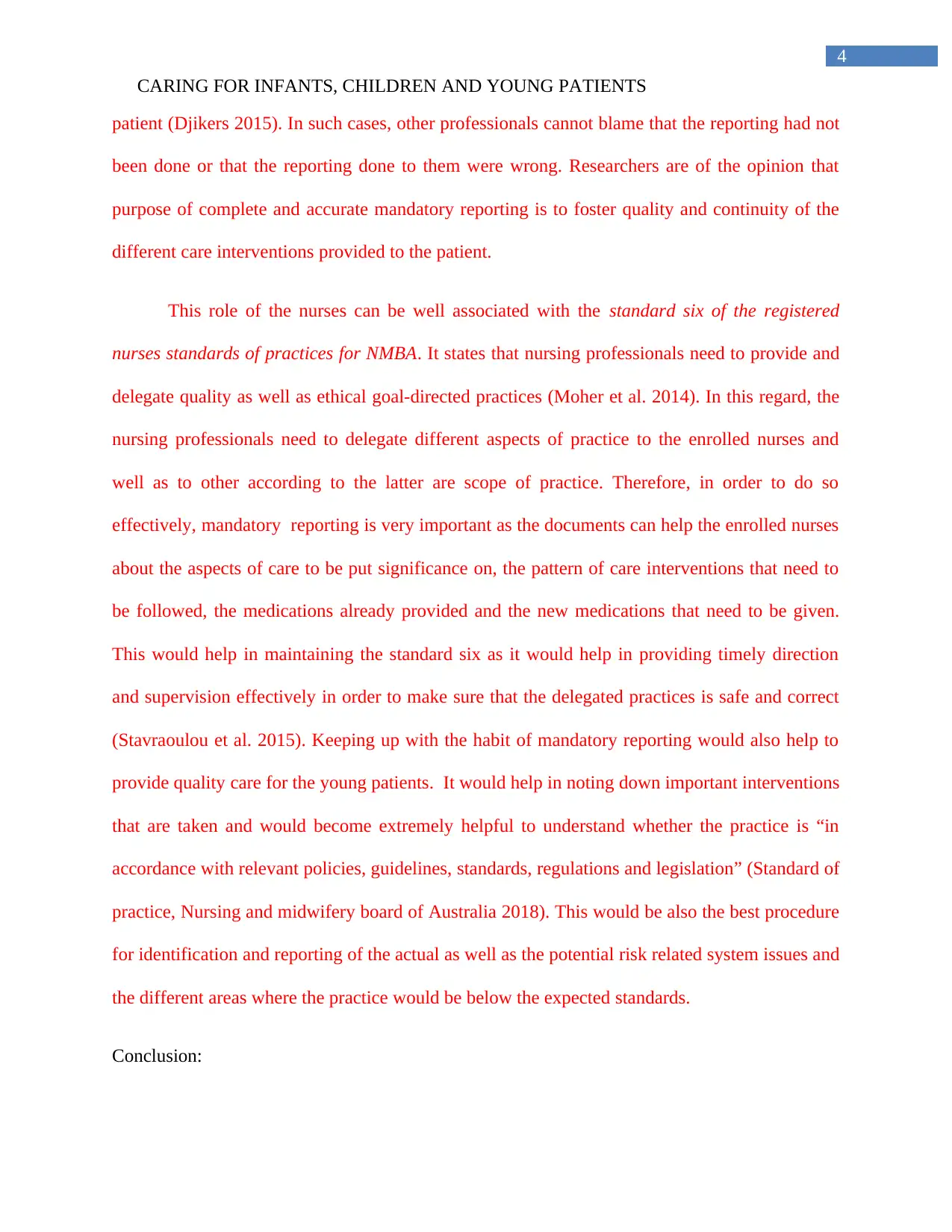
4
CARING FOR INFANTS, CHILDREN AND YOUNG PATIENTS
patient (Djikers 2015). In such cases, other professionals cannot blame that the reporting had not
been done or that the reporting done to them were wrong. Researchers are of the opinion that
purpose of complete and accurate mandatory reporting is to foster quality and continuity of the
different care interventions provided to the patient.
This role of the nurses can be well associated with the standard six of the registered
nurses standards of practices for NMBA. It states that nursing professionals need to provide and
delegate quality as well as ethical goal-directed practices (Moher et al. 2014). In this regard, the
nursing professionals need to delegate different aspects of practice to the enrolled nurses and
well as to other according to the latter are scope of practice. Therefore, in order to do so
effectively, mandatory reporting is very important as the documents can help the enrolled nurses
about the aspects of care to be put significance on, the pattern of care interventions that need to
be followed, the medications already provided and the new medications that need to be given.
This would help in maintaining the standard six as it would help in providing timely direction
and supervision effectively in order to make sure that the delegated practices is safe and correct
(Stavraoulou et al. 2015). Keeping up with the habit of mandatory reporting would also help to
provide quality care for the young patients. It would help in noting down important interventions
that are taken and would become extremely helpful to understand whether the practice is “in
accordance with relevant policies, guidelines, standards, regulations and legislation” (Standard of
practice, Nursing and midwifery board of Australia 2018). This would be also the best procedure
for identification and reporting of the actual as well as the potential risk related system issues and
the different areas where the practice would be below the expected standards.
Conclusion:
CARING FOR INFANTS, CHILDREN AND YOUNG PATIENTS
patient (Djikers 2015). In such cases, other professionals cannot blame that the reporting had not
been done or that the reporting done to them were wrong. Researchers are of the opinion that
purpose of complete and accurate mandatory reporting is to foster quality and continuity of the
different care interventions provided to the patient.
This role of the nurses can be well associated with the standard six of the registered
nurses standards of practices for NMBA. It states that nursing professionals need to provide and
delegate quality as well as ethical goal-directed practices (Moher et al. 2014). In this regard, the
nursing professionals need to delegate different aspects of practice to the enrolled nurses and
well as to other according to the latter are scope of practice. Therefore, in order to do so
effectively, mandatory reporting is very important as the documents can help the enrolled nurses
about the aspects of care to be put significance on, the pattern of care interventions that need to
be followed, the medications already provided and the new medications that need to be given.
This would help in maintaining the standard six as it would help in providing timely direction
and supervision effectively in order to make sure that the delegated practices is safe and correct
(Stavraoulou et al. 2015). Keeping up with the habit of mandatory reporting would also help to
provide quality care for the young patients. It would help in noting down important interventions
that are taken and would become extremely helpful to understand whether the practice is “in
accordance with relevant policies, guidelines, standards, regulations and legislation” (Standard of
practice, Nursing and midwifery board of Australia 2018). This would be also the best procedure
for identification and reporting of the actual as well as the potential risk related system issues and
the different areas where the practice would be below the expected standards.
Conclusion:
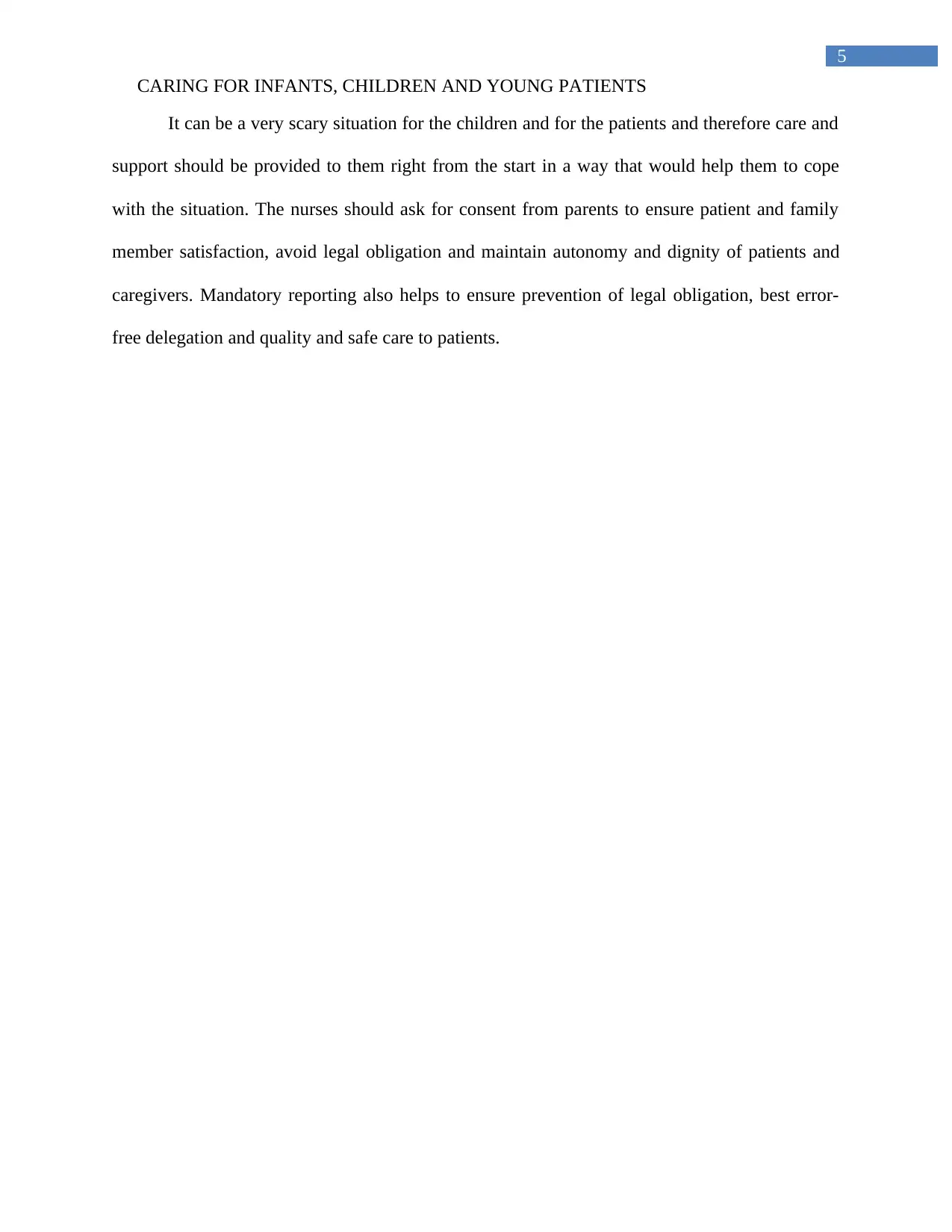
5
CARING FOR INFANTS, CHILDREN AND YOUNG PATIENTS
It can be a very scary situation for the children and for the patients and therefore care and
support should be provided to them right from the start in a way that would help them to cope
with the situation. The nurses should ask for consent from parents to ensure patient and family
member satisfaction, avoid legal obligation and maintain autonomy and dignity of patients and
caregivers. Mandatory reporting also helps to ensure prevention of legal obligation, best error-
free delegation and quality and safe care to patients.
CARING FOR INFANTS, CHILDREN AND YOUNG PATIENTS
It can be a very scary situation for the children and for the patients and therefore care and
support should be provided to them right from the start in a way that would help them to cope
with the situation. The nurses should ask for consent from parents to ensure patient and family
member satisfaction, avoid legal obligation and maintain autonomy and dignity of patients and
caregivers. Mandatory reporting also helps to ensure prevention of legal obligation, best error-
free delegation and quality and safe care to patients.
⊘ This is a preview!⊘
Do you want full access?
Subscribe today to unlock all pages.

Trusted by 1+ million students worldwide
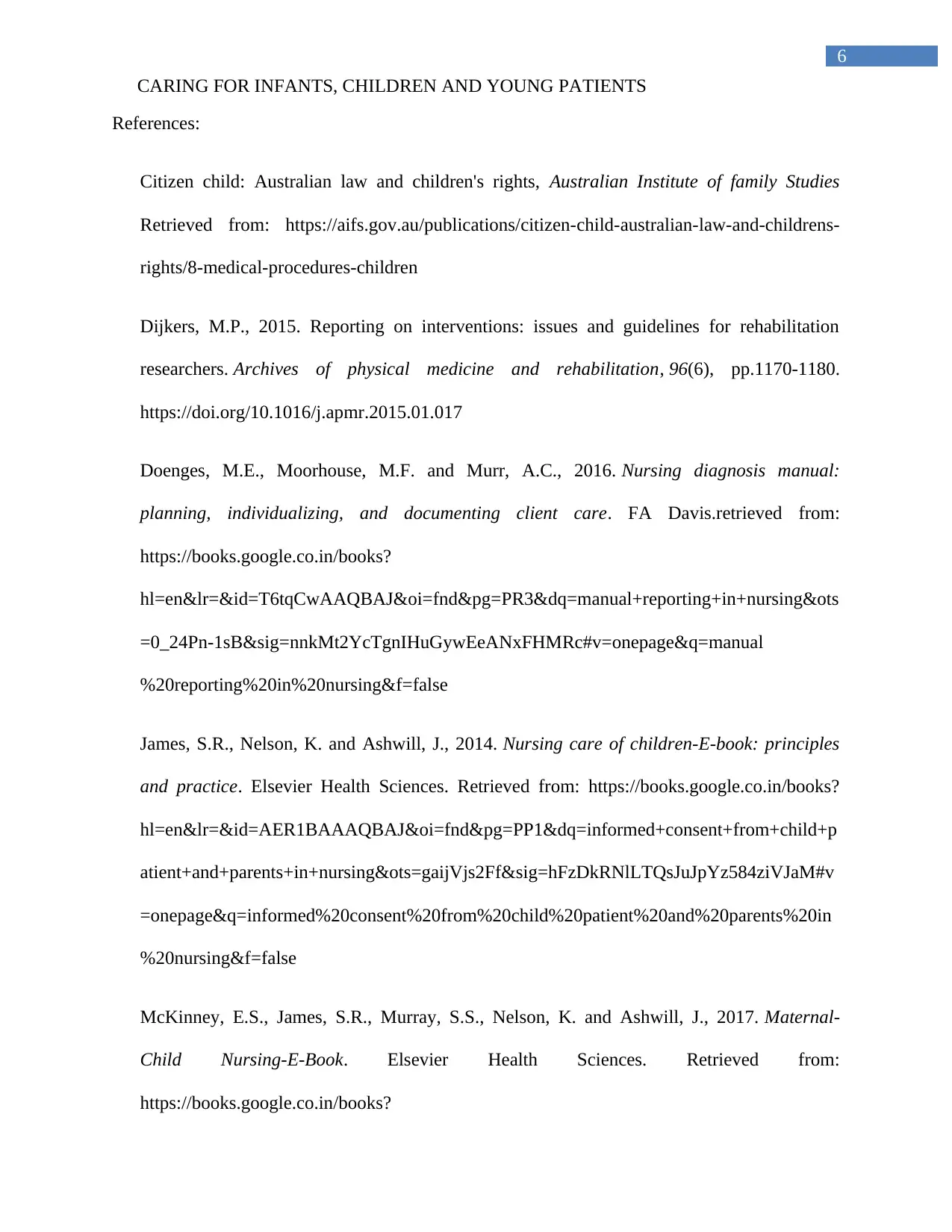
6
CARING FOR INFANTS, CHILDREN AND YOUNG PATIENTS
References:
Citizen child: Australian law and children's rights, Australian Institute of family Studies
Retrieved from: https://aifs.gov.au/publications/citizen-child-australian-law-and-childrens-
rights/8-medical-procedures-children
Dijkers, M.P., 2015. Reporting on interventions: issues and guidelines for rehabilitation
researchers. Archives of physical medicine and rehabilitation, 96(6), pp.1170-1180.
https://doi.org/10.1016/j.apmr.2015.01.017
Doenges, M.E., Moorhouse, M.F. and Murr, A.C., 2016. Nursing diagnosis manual:
planning, individualizing, and documenting client care. FA Davis.retrieved from:
https://books.google.co.in/books?
hl=en&lr=&id=T6tqCwAAQBAJ&oi=fnd&pg=PR3&dq=manual+reporting+in+nursing&ots
=0_24Pn-1sB&sig=nnkMt2YcTgnIHuGywEeANxFHMRc#v=onepage&q=manual
%20reporting%20in%20nursing&f=false
James, S.R., Nelson, K. and Ashwill, J., 2014. Nursing care of children-E-book: principles
and practice. Elsevier Health Sciences. Retrieved from: https://books.google.co.in/books?
hl=en&lr=&id=AER1BAAAQBAJ&oi=fnd&pg=PP1&dq=informed+consent+from+child+p
atient+and+parents+in+nursing&ots=gaijVjs2Ff&sig=hFzDkRNlLTQsJuJpYz584ziVJaM#v
=onepage&q=informed%20consent%20from%20child%20patient%20and%20parents%20in
%20nursing&f=false
McKinney, E.S., James, S.R., Murray, S.S., Nelson, K. and Ashwill, J., 2017. Maternal-
Child Nursing-E-Book. Elsevier Health Sciences. Retrieved from:
https://books.google.co.in/books?
CARING FOR INFANTS, CHILDREN AND YOUNG PATIENTS
References:
Citizen child: Australian law and children's rights, Australian Institute of family Studies
Retrieved from: https://aifs.gov.au/publications/citizen-child-australian-law-and-childrens-
rights/8-medical-procedures-children
Dijkers, M.P., 2015. Reporting on interventions: issues and guidelines for rehabilitation
researchers. Archives of physical medicine and rehabilitation, 96(6), pp.1170-1180.
https://doi.org/10.1016/j.apmr.2015.01.017
Doenges, M.E., Moorhouse, M.F. and Murr, A.C., 2016. Nursing diagnosis manual:
planning, individualizing, and documenting client care. FA Davis.retrieved from:
https://books.google.co.in/books?
hl=en&lr=&id=T6tqCwAAQBAJ&oi=fnd&pg=PR3&dq=manual+reporting+in+nursing&ots
=0_24Pn-1sB&sig=nnkMt2YcTgnIHuGywEeANxFHMRc#v=onepage&q=manual
%20reporting%20in%20nursing&f=false
James, S.R., Nelson, K. and Ashwill, J., 2014. Nursing care of children-E-book: principles
and practice. Elsevier Health Sciences. Retrieved from: https://books.google.co.in/books?
hl=en&lr=&id=AER1BAAAQBAJ&oi=fnd&pg=PP1&dq=informed+consent+from+child+p
atient+and+parents+in+nursing&ots=gaijVjs2Ff&sig=hFzDkRNlLTQsJuJpYz584ziVJaM#v
=onepage&q=informed%20consent%20from%20child%20patient%20and%20parents%20in
%20nursing&f=false
McKinney, E.S., James, S.R., Murray, S.S., Nelson, K. and Ashwill, J., 2017. Maternal-
Child Nursing-E-Book. Elsevier Health Sciences. Retrieved from:
https://books.google.co.in/books?
Paraphrase This Document
Need a fresh take? Get an instant paraphrase of this document with our AI Paraphraser
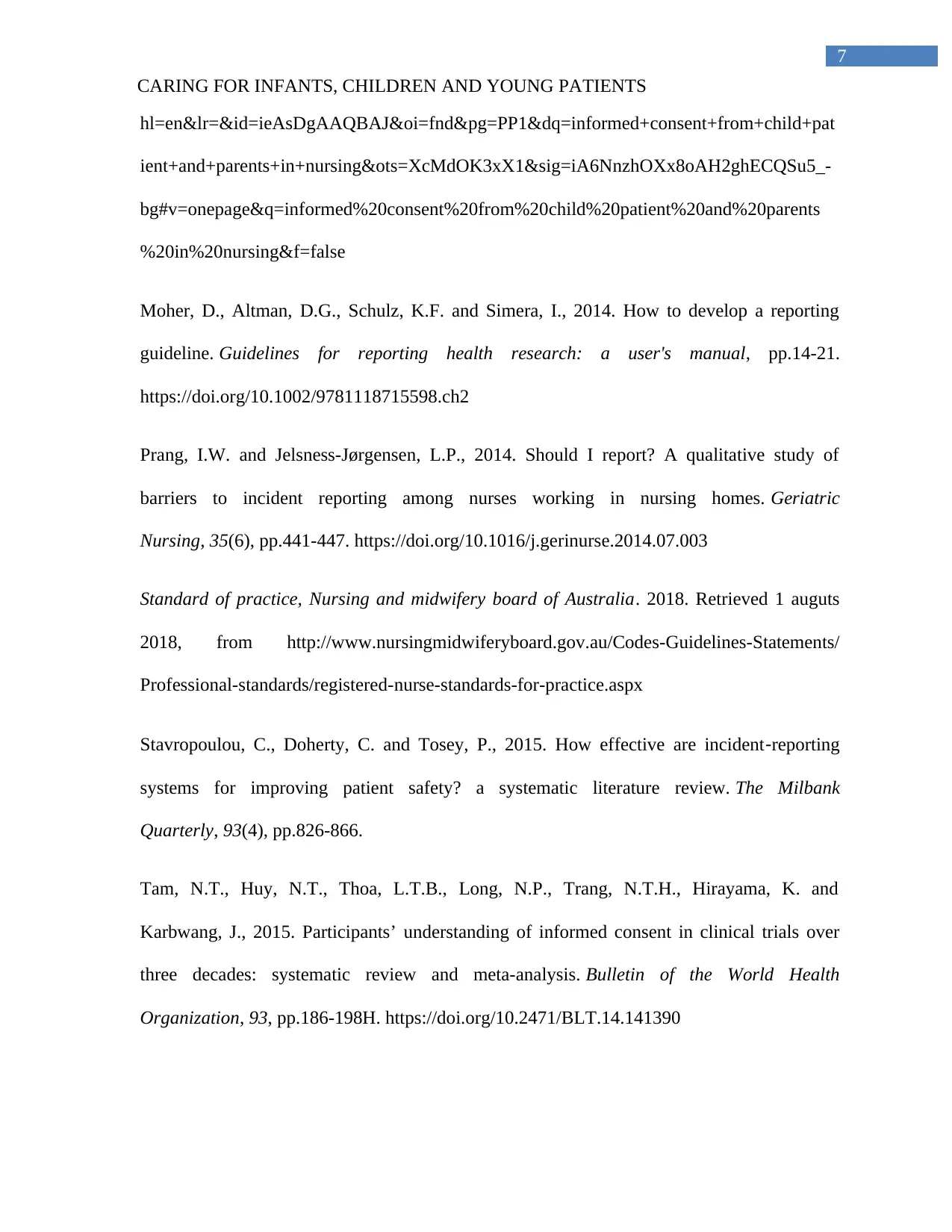
7
CARING FOR INFANTS, CHILDREN AND YOUNG PATIENTS
hl=en&lr=&id=ieAsDgAAQBAJ&oi=fnd&pg=PP1&dq=informed+consent+from+child+pat
ient+and+parents+in+nursing&ots=XcMdOK3xX1&sig=iA6NnzhOXx8oAH2ghECQSu5_-
bg#v=onepage&q=informed%20consent%20from%20child%20patient%20and%20parents
%20in%20nursing&f=false
Moher, D., Altman, D.G., Schulz, K.F. and Simera, I., 2014. How to develop a reporting
guideline. Guidelines for reporting health research: a user's manual, pp.14-21.
https://doi.org/10.1002/9781118715598.ch2
Prang, I.W. and Jelsness-Jørgensen, L.P., 2014. Should I report? A qualitative study of
barriers to incident reporting among nurses working in nursing homes. Geriatric
Nursing, 35(6), pp.441-447. https://doi.org/10.1016/j.gerinurse.2014.07.003
Standard of practice, Nursing and midwifery board of Australia. 2018. Retrieved 1 auguts
2018, from http://www.nursingmidwiferyboard.gov.au/Codes-Guidelines-Statements/
Professional-standards/registered-nurse-standards-for-practice.aspx
Stavropoulou, C., Doherty, C. and Tosey, P., 2015. How effective are incident‐reporting
systems for improving patient safety? a systematic literature review. The Milbank
Quarterly, 93(4), pp.826-866.
Tam, N.T., Huy, N.T., Thoa, L.T.B., Long, N.P., Trang, N.T.H., Hirayama, K. and
Karbwang, J., 2015. Participants’ understanding of informed consent in clinical trials over
three decades: systematic review and meta-analysis. Bulletin of the World Health
Organization, 93, pp.186-198H. https://doi.org/10.2471/BLT.14.141390
CARING FOR INFANTS, CHILDREN AND YOUNG PATIENTS
hl=en&lr=&id=ieAsDgAAQBAJ&oi=fnd&pg=PP1&dq=informed+consent+from+child+pat
ient+and+parents+in+nursing&ots=XcMdOK3xX1&sig=iA6NnzhOXx8oAH2ghECQSu5_-
bg#v=onepage&q=informed%20consent%20from%20child%20patient%20and%20parents
%20in%20nursing&f=false
Moher, D., Altman, D.G., Schulz, K.F. and Simera, I., 2014. How to develop a reporting
guideline. Guidelines for reporting health research: a user's manual, pp.14-21.
https://doi.org/10.1002/9781118715598.ch2
Prang, I.W. and Jelsness-Jørgensen, L.P., 2014. Should I report? A qualitative study of
barriers to incident reporting among nurses working in nursing homes. Geriatric
Nursing, 35(6), pp.441-447. https://doi.org/10.1016/j.gerinurse.2014.07.003
Standard of practice, Nursing and midwifery board of Australia. 2018. Retrieved 1 auguts
2018, from http://www.nursingmidwiferyboard.gov.au/Codes-Guidelines-Statements/
Professional-standards/registered-nurse-standards-for-practice.aspx
Stavropoulou, C., Doherty, C. and Tosey, P., 2015. How effective are incident‐reporting
systems for improving patient safety? a systematic literature review. The Milbank
Quarterly, 93(4), pp.826-866.
Tam, N.T., Huy, N.T., Thoa, L.T.B., Long, N.P., Trang, N.T.H., Hirayama, K. and
Karbwang, J., 2015. Participants’ understanding of informed consent in clinical trials over
three decades: systematic review and meta-analysis. Bulletin of the World Health
Organization, 93, pp.186-198H. https://doi.org/10.2471/BLT.14.141390
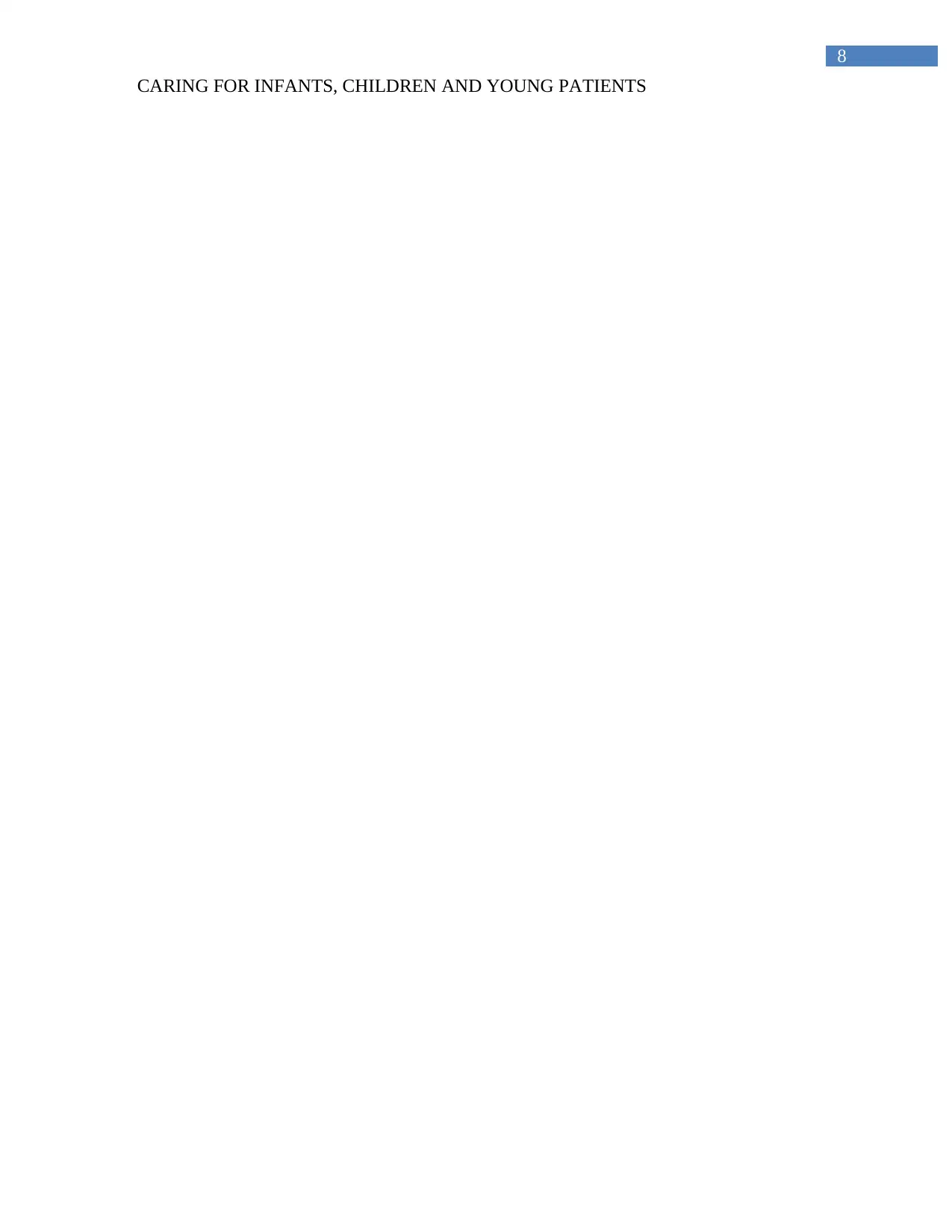
8
CARING FOR INFANTS, CHILDREN AND YOUNG PATIENTS
CARING FOR INFANTS, CHILDREN AND YOUNG PATIENTS
⊘ This is a preview!⊘
Do you want full access?
Subscribe today to unlock all pages.

Trusted by 1+ million students worldwide
1 out of 9
Related Documents
Your All-in-One AI-Powered Toolkit for Academic Success.
+13062052269
info@desklib.com
Available 24*7 on WhatsApp / Email
![[object Object]](/_next/static/media/star-bottom.7253800d.svg)
Unlock your academic potential
Copyright © 2020–2026 A2Z Services. All Rights Reserved. Developed and managed by ZUCOL.





